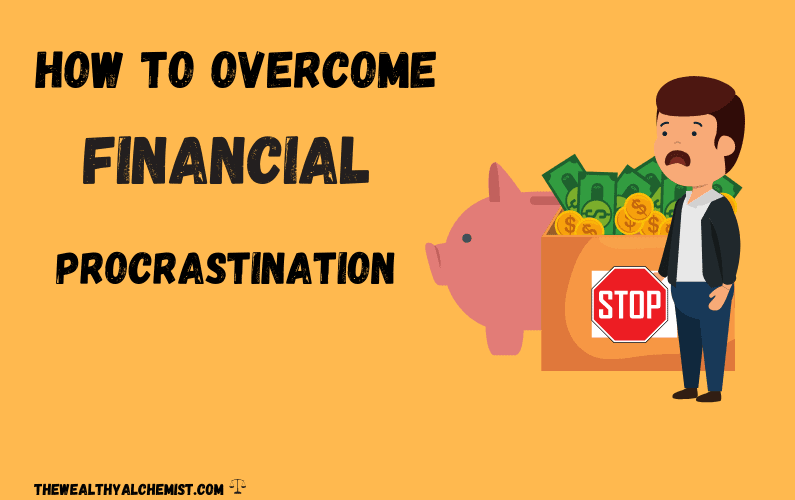
Updated: July 28, 2019.
Financial procrastination is like a black hole in your bank account.
But what is financial procrastination exactly?
Well, just think of all the resolutions you’ve made to yourself to get your finances under control.
How many times have you told yourself, “This is going to be my year of financial success!”?
Perhaps you even bought a budget worksheet and a gold notebook because the color represents your high standards and inspires you to do your best.
Your conversation goes on…
“Yes, this year, I’m going to create a budget pay off my debt, save for retirement, and start my journey to financial independence!”
Your desire to be wealthy and retire early keeps your flame alive for the first few months of the year.
But now, it’s almost August. And you are too busy and tired to remember all those promises. You can’t even bring yourself to look at your golden journal.
Instead, you start putting things off.
If you are like the vast majority of Americans, you may have spent long hours on your sofa browsing your phone or searching for something to watch on Hulu.
Of course, while you are doing that, you won’t be working towards the resolutions you have made before.
The ideas about early retirement and being wealthy will become cloudy and remote.
Now, you are back in your old habits, and you don’t blame yourself.
You have created an incredible story to justify your actions.
So incredible and compelling, in fact, that even Hollywood would contact you to make a movie from it if you’d only write out the script![]() .
.
Does this story sound familiar to you?
This is financial procrastination.

Contents
- 1 The cost of financial procrastination
- 2 Causes of financial procrastination
- 3 2. Unrealistic or vague goals creates financial procrastination
- 4 3. Uncertainty creates financial procrastination
- 5 4. Fear of failure causes financial procrastination
- 6 5. Lack of motivation creates financial procrastination
- 7 6. Wanting to avoid responsibility creates financial procrastination
- 8 7. A desire for instant gratification creates financial procrastination
- 9 8. Financial hopelessness creates financial procrastination
- 10 Final Thoughts
The cost of financial procrastination
Delaying things is something we all do on occasion.
Some of those things are irrelevant and don’t cause any problems.
But sometimes delay can cause serious issues. This is especially the case when the things we’re putting off are money-related.
If you are like me, maybe you have learned this lesson the hard way.
Whether it’s paying your bills late, doing your taxes at the last minute, or failing to create a plan for your financial future. The consequences of financial procrastination can be excruciating.
But hey, maybe I’m just being overly dramatic. I’m sure that some people feel that leaving things to the last minute isn’t really that big a deal.
I mean, some of us work better under pressure. And as long as you get everything done, does it really matter if you do it at the last minute or in the first minute?
Well, yes! It matters a great deal!
For one, getting things done at the last minute only works for certain types of things like paying bills or doing your taxes.
But for other things, such as retirement planning waiting until your 65th birthday isn’t going to cut it.
And budgeting isn’t something that you can do at the last minute either. You have to control your spending now, while you still have money, or you’ll be wondering where it all went once your money’s gone.
So financial procrastination really does make a difference.
Besides the financial cost, procrastination also has effects on your emotional health and is one of the leading causes of stress in individuals.
Now, we know that procrastination costs us money and health. But why do we keep doing it?
Causes of financial procrastination
1. A poor sense of time causes financial procrastination
Maybe you are an optimistic procrastinator.
You know that you need to take care of your finances. But “I’ll do it later” is your favorite excuse, because you think you have all the time in the world.
Optimistic procrastinators know that their task doesn’t have to be done today or tomorrow, so they put it off in favor of other things.
They always remain hopeful, though, believing they can complete everything on schedule, no matter how much time they have left.
Several consequences come from this thought process. One of the most immediate is falling behind on your monthly bill payments.
And being late with your payments can have critical consequences, such as outrageous late fees or even a damaged your credit score.
Another consequence of financial procrastination is a
One thing you want even less than that is to reach retirement age only to realize that you’ve got exactly nothing to live off.
The point is…procrastination is painful in more ways than one.
If this is a problem for you here are some tips to help you stay on top of things:
Related Post: What Money Means to You- 7 Clues to Your Money Habits.
Tips
- Set reminders in your calendar to keep track of your due dates.
- Review your monthly expenditures to see when you have recurring cash outflows. This can be done easily with Personal Capital.
Personal capital is a free app that organizes your expenses for you. It makes it extremely easy to examine and analyze your expenses all in one place. If you are ready to take control over your money you can sign up here.
- Make sure you know where you are
financially . Start by checking and staying on top of your credit score.
Why? Because your credit score will have a significant impact on your financial future. If you plan on getting a loan, renting an apartment, or even opening an account with a utility company, then you should be concerned with your credit score.
If you want to check how your credit score is doing. You can use a free credit checker like Credit Sesame.
Credit Sesame will not only give you tips on how to improve your score but being aware of it will cause you to want to protect your score.
And this, more than anything, will reduce your habit of procrastination. Go ahead and sign up for Credit Sesame here!
2. Unrealistic or vague goals creates financial procrastination
Unrealistic or vague goals are a recipe for failure.
Just think, if you set an unrealistic goal, you’ll inevitably fail.
Imagine that you plan to eliminate your social life in order to save money.
You think you’ll be able to save hundreds by doing this. But at the end of the month, you were only able to save $50.
How will you feel after that? Probably not too good right? That’s because you created a goal that was unrealistic for you.
Likewise, if you don’t have a well-defined goal, you’ll never actually know when you’ve succeeded.
For example, if you want to save money this month, but you never decide how much you’re going to save, you won’t really know if you’ve accomplished your goal or not.
And nothing is more frustrating than working towards something and never actually arriving anywhere.
These are things that will make us feel like failures. And failure may cause us to avoid trying again.
After all, we’ve tried it once, and it didn’t work.
But creating well-defined, reasonable goals (with deadlines) can help you avoid failure and achieve success in any financial goals you want to achieve.
Tips
If you have trouble setting (or sticking to) savings goals, for example, then you can try these strategies to start saving money from your salary.
Or find here how you can organize the process to save money, and find the best creative ideas to save money from any category in your budget!
Related post: Tips for developing a wealthy mindset.
3. Uncertainty creates financial procrastination
If you are not sure where to start to get your finances under control, you’ll become indecisive and put things off as long as possible.
The best way to get started is by determining where you currently are financially and deciding where you want to be.
After that, you just have to create a plan (i.e. budget) to help you plan what to do with your money.
Budgeting is a must. As it serves as a road map that guides you towards your financial goals.
If you’re not sure how to start simply write down your income and expenses. And after you’ve done that, allocate any excess money you have to specific tasks.
Again, try to be reasonable with yourself to maximize your chances of actually sticking to your budget.
Tips
Learn your spending habits by reviewing your past expenditures on Personal Capital. Cut out the unnecessary purchases but keep the things that bring the most value to you.
Another tool that can help you budget is Empower. This app also allows you to track your expenses easily and lets you know when you’ve exceeded your monthly spending limit.

4. Fear of failure causes financial procrastination
“I can’t do this, it’s too much!”
Thoughts like this immediately create limiting beliefs.
Fear of failure can paralyze. It means you won’t take the risk because you experience the negative outcome in advance.
You won’t be able to make things right with your money, and your financial future will be dictated by fear.
But it doesn’t have to be this way.
Just by creating an investment plan or saving a few dollars for retirement, you can change the course of your financial future.
The best option is to start with small goals and progressively build upon them.
If you’re not sure how to start, you can automate the process of investing by using Acorns.
Acorns is an app that will round up every purchase you make to the nearest dollar and invest the change it saves from your purchases.
While you’re not going to build a vast investment portfolio doing this, it’s an excellent way to at least start if you’re at ground zero and finds it difficult to save for investing opportunities.
Related post: What money Means to You- 7 Clues to Your Money Habits.
5. Lack of motivation creates financial procrastination
If getting your finances under control isn’t interesting to you, you won’t have any motivation to start taking control of your money.
This will be the main reason you’ll put things off and keep your old money habits alive.
But the reality is, most people who aren’t motivated by or interested in their financial situation probably haven’t thought that much about the consequences of it.
Who doesn’t want to leave their 9 to 5 and be financially independent? Who doesn’t want to maintain their lifestyle in retirement?
These things are possible if you take an interest in getting your finances in order now. And poverty may await if you remain apathetic.
If you need more motivation for getting your finances under control, you can read some of the best inspirational money quotes here to start being more motivated!
6. Wanting to avoid responsibility creates financial procrastination
Often, especially for couples, one person is financially responsible and the other is just along for the ride.
In these cases the person who doesn’t know doesn’t care, or can’t be bothered is in a very dangerous position.
Everything will probably be fine as long as their responsible husband/wife is there handling the money. But what happens when their spouse is no longer around?
Let me illustrate the point with a story. I once knew a woman who couldn’t be bothered to get involved with the finances. She put off learning about it because she didn’t see the point.
Her husband handled everything. And they were extremely wealthy (so he must have been doing something right!).
She only knew that she had money in her pocket and that was the way she liked it.
But one day her husband died unexpectedly and she panicked. She withdrew all of her investments because she didn’t know any better.
Next thing she knew the IRS sent her a bill for hundreds of thousands of dollars…
That’s a hefty price for financial procrastination.
So you see, ignorance may be bliss for a while, but you’re going to have to pay the piper eventually.
Related post: 10 Personal Finance Books You Must Read And Master!
7. A desire for instant gratification creates financial procrastination
We often justify our lack of discipline to ourselves.
Instead of staying the course, paying debts and saving cash, we’ll tell ourselves something like this:
“I work hard and pay my taxes. I’m getting myself a treat!”
“I can’t stay inside looking at the walls all day. I’ll just go out to the store and look around.”
These are examples of excuses we’ll tell ourselves to justify impulsive spending and a lack of discipline.
These excuses usually have some truth in them and so may seem reasonable. And impulsive spending may not cause that much chaos if done only once or twice.
But the problem is, more often than not, it’s a regularly recurring event.
8. Financial hopelessness creates financial procrastination
Being in a difficult financial situation makes financial procrastination easy.
Maybe bill collectors are blowing up your phone. Perhaps you have an incredible amount of credit card and personal loan debt.
Often when we’re in an overwhelming situation, we dread even looking at the reality of it. This is one of the biggest reasons that cause financial procrastination.
If you’re in this type of situation, the best thing you can do is just confront it. Even listening to financial programs such as Dave Ramsey’s radio show may help you realize that a lot of people have a worse situation than you.
You will realize that if there’s a solution for them, there must be a solution for you as well.
Final Thoughts
There are many hidden costs to financial procrastination. Some are short term costs and others are devastatingly long-lasting.
Although this is the reality, many of us continue to engage in this wealth sapping activity for various reasons.
Whether it’s our unrealistic goals, uncertainty, fear, a lack of motivation or just a desire to unload the responsibility.
Whatever the reason, there’s a solution out there to help us overcome what’s holding us back.
If you’re ready to break the habit of financial procrastination then spend some time figuring out what your root cause is and how you can tackle it.
If you’ve already managed to get on top of your finances then please let us know how you did it in the comments below!
Cheers!

Idalmis
Latest posts by Idalmis (see all)
- Why Is Budgeting Important? 12 Best Reasons to Start Budgeting Today! - October 6, 2020
- How to be Frugal With Groceries. Must Try Tips! - September 15, 2020
- Is Skillshare Worth It? Best 2020 Review - August 31, 2020



